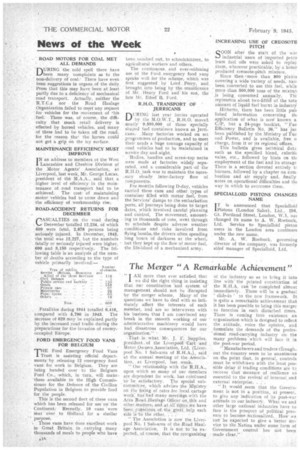News of the Week
Page 20

If you've noticed an error in this article please click here to report it so we can fix it.
ROAD MOTORS FOR COAL MET ALL DEMANDS rijUR.ING 'the cold spell there have Libeen many 'complaints as to the non-delivery of coal: There have even been suggestions in organs, of the daily. Press that this may have been at least partly due to a deficiency of mechanical road transport. Actually, neither the R.T.C. nor the Road Haulage Organization failed to meet any request
• for vehicles for the movement of this fuel. There was, of course, the difficulty . that much retail delivery is -effected by horsed vehicles, and many of these had to he taken off the road, for the reason tha:t the horses could not get a grip, on the icy surface. MAINTENANCE EFFICIENCY MUST
IMPROVE
IN an address to members of the West Lancashire and Cheshire Division of the Motor Agents! Association, at Liverpool, last week, Mr. George Lucas, president of the M.A.A., said that a .higher level of efficiency in the maintenance of road transport had to be achieved. The costof maintaining motor vehicles had to come down and the efficiency of workmanship rise. ROAD-ACCIDENT RETURNS FOR
DECEMBER
CASUALTIES on the road during December totalled 12,234, of which 609 were fatal, 2,878 persons being seriously injured. In December, 194, the total was 12,227, but the numbers fatally or seriously injured were higher, 690 and 3,150 respectively. The fols lowing table is an analysis of the number of deaths according to the type of Vehicle primarily involved:— Fatalities during 1944 totalled 6-,-4.16, compared with 5,796 in 1943. The increase of 620 may be explained partly by the increased road traffic during the preparations for the invasion of enemy' occupied Europe.
• FORD EMERGENCY FOOD VANS FOR • BELGIUM
THE Ford Emergency Food Vans Trust is assisting official departments -by releasing 12 emergency food vans for work in Belgium. They are being handed over to the Belgium Ford Co., which, in turn, will make. them available to the High Commissioner for the Defence of the Civilian Population in Belgium to provide food for the people.
This is the second fleet of these vans which has been released for use on the Continent: Recently, 10 vans ' were Sent over to Holland for a similar • purpose.
. These vans have done excellent work in Great Britain in carrying many thousands of meals to people who have Al S been . bombed out, to schoolchildren,, to agricultural workers and others.
The continuous, and ever-widening use of the Ford .emergency food ,vane speaks well for the scheme, which was first suggested by Lord Perry, and brought into being by the munificence of Mr. Henry Ford and 'his son, the late Mr, Edsef R. Ford.
R.H.O. TRANSPORT OF •
DtIRING last year lorries operated by the 11.0.W.T., R.H.O. moved. nearly 9,500,000, of those specially shaped fuel containers known as Jerricans. Many factories worked on set .programmes of production, and to meet their needs a huge tonnage capacity of road vehicles had to be maintained in service day and night.
'Bodies, handles and screW-top necks were made at factories widely separated, and a considerable part -of the R.H.O. task was to maintain the necessary steady, inter-factory flow of components.
For months following D-day, vehicles carried these cans and other types of container filled with motor fuel, from the Services' dumps to the embarkation ports, all journeys being done to target dates, which involved careful planning and control. The movement, amounting to thousands of tons, went through to schedule despite adverse weather conditions and risks involved from. flying bombs, the drivers often spending long hours of darkness at the wheel, but they kept up the flow of motor fuel, the life-blood of a mechanized army.




















































